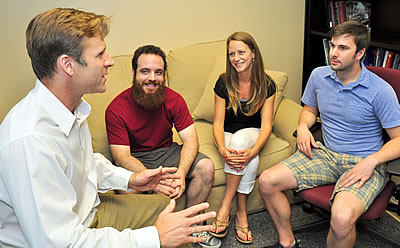You’re walking home from work and witness a crime. A man leaps from a dark alley, grabs a woman’s purse and races past you. It’s too dangerous to chase him, but you get a clear look at his face and what he’s wearing. The victim isn’t hurt, but she’s crying, and several onlookers have called 911.
You know that the police will arrive soon and will ask for witnesses, and that your description could help nail the guy. You also know that you need to get dinner on the table in 20 minutes so your daughter doesn’t miss soccer practice, and you promised your aging mom that you would help her with her taxes tonight. What would you do?
Most of us would like to believe that we would help a complete stranger in distress, even if it messed with our to-do list. And most of us, says Michael McCullough, would be dead wrong.

McCullough is a psychology professor in the College of Arts & Sciences (A&S) and director of the Evolution and Human Behavior Laboratory. In the lab, McCullough and his team — which includes undergraduate research assistants, graduate students, and even high school students — test some fundamental assumptions of human behavior through the lens of evolutionary psychology.
“In evolutionary psychology, we want to ask the exact same kind of questions about human behavior that any respectable biologist would want to ask about the behavior of any organism,” says McCullough, namely: why do we do what we do? “What’s anger for? What’s gratitude for? Why bother forgiving someone who was mean to you in the past? How do we decide what goals to pursue?”
Evolutionary psychology isn’t a branch of psychology, McCullough explains. It’s an approach to understanding all of psychology by using the conceptual tools of evolutionary biology. The brain, evolutionary psychologists argue, has evolved according to the same rules of natural selection as any other organ or organism.
Consider the “fight or flight” response. Millions of years ago, our distant ancestors survived and passed on their DNA because their brains had evolved a way to quickly respond to life-threatening attacks. Even though we’re less likely to be a saber-tooth tiger snack today, we still carry the fight or flight instinct deep in our hypothalamus, and that affects our behavior here and now.
McCullough is currently less interested in fight or flight than in a phenomenon called “altruistic punishment.” Let’s go back to our original scenario, where a complete stranger has been injured by another complete stranger. Most of us think we would expend reasonable effort — sacrifice time, energy, even money — to help punish someone who did a bad thing to a stranger. Many of McCullough’s colleagues in other fields of social science who have also been inspired by evolutionary theory have even “proven” that altruistic punishment exists, but McCullough has his doubts.
“It’s a very popular idea out there in social science right now; ‘Humans are wonderfully selfless creatures because we evolved to take costly action on behalf of mistreated strangers.’ But it’s based on theoretical claims that fly in the face of what we know about natural selection,” McCullough says.
To rigorously test the theory, McCullough’s lab designed an experiment in which an unseen individual, called a “dictator,” takes money from the test subject’s laboratory “bank account.” The subject is given the option of exacting revenge on the dictator, but it will cost a little more money. On average, test subjects opted to spend the extra money to punish the dictator.
But what if the scenario is changed and the dictator steals from a stranger? In that case, almost none of the subjects were willing to pay an additional cost to punish the dictator. And the few who did, concluded McCullough, were acting out of “envy” for the dictator — who appeared to have more money than them — not out of righteous indignation or moral obligation to the victim.
“What do we learn from that experiment?” asks McCullough. “We learn a little bit about the computational circuitry that governs the experience of anger and retaliation, the behavior we call revenge. Ancestrally, humans who were willing to retaliate against individuals who had harmed them directly would deter the ‘bad guy’ from repeating the offense, thereby improving our ancestors’ reproductive success.”
“When we put people in this experimental box, we can carefully isolate the conditions that trigger retaliation. It turns out that third-person injustice isn’t enough to trigger it. On the surface, the question might seem simple and obvious” — Why do we punish people who hurt us? — “but what we are doing in the lab enables us to identify the fundamental conditions that turn the human revenge circuit on.”

The application of McCullough’s findings are far-reaching. Governments, for example, could use the data when writing “whistleblower” laws, or the laws that govern how we should behave when we come across a stranger in need. Understanding how rare it is for an individual to put himself at risk to help strangers might motivate policymakers to raise the incentives to promote altruistic behavior.
McCullough loves working with A&S undergraduates and high school students in his lab. The work they do is not only scientifically rigorous, but deals with topics that tend to be accessible and fascinating, which gets the students excited about science.
“I want my students to see that real science isn’t done only by white men with long grey beards,” McCullough says. “It’s mostly done by young people — from all sorts of backgrounds — who have energy and enthusiasm, and who and like to think hard and work hard.”
Learn more about the Evolution and Human Behavior Laboratory and watch a video of Professor McCullough explaining the fundamentals of evolutionary psychology.

